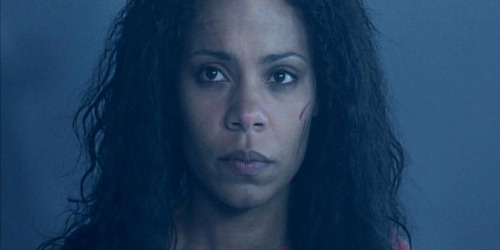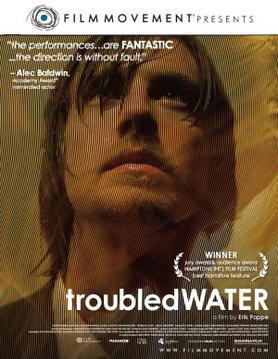In
Alien vs. Predator, Sebastian de Rosa (Raoul Bova) says to Alexa Woods (Sanaa Lathan), “The enemy of my enemy is my friend.”
1 The enemy in this film’s case is the titular Alien species, and the friend, therefore, is the Predator.
 |
Alexa Woods, played by Sanaa Lathan, showing the mark of a successful hunt on her left cheek.
|
Why?
Later, Woods says, upon seeing the Queen, “You are one ugly mother...” (She trails off, but “fucker” would have been the next word.) It is said with clear hatred, but, again, why? As
Alien vs. Predator’s main character, Woods takes on the task of fighting the xenomorphs alongside Scar (played by Ian Whyte), the main Predator. By the end of the film, they form a bond, of sorts, of the kind shared by two warriors (and from the looks they exchange after Scar unmasks, one imagines they would share much more in the pornographic remake), as well as sharing the acid-tinged symbols of a successful kill on their faces.
How does Woods come to this point? We can make our own reasons for siding with the Predators. Like the Aliens, they have two legs, two arms, a head, a mouth, and,
presumably in the Aliens’ case, two eyes, so anthropomorphising is easy, but perhaps the Aliens are uglier, less methodical, more gruesome in nature, making it harder for her and us to identify with them. The Aliens appear to kill and capture without thought and feeling, while Scar appears to be intelligent and thoughtful. The Aliens are merciless; Scar spares the life of Charles Bishop Weyland (Lance Henriksen) - for a moment.
But it is here, that we encounter a problem the film itself seemingly attempts to avoid: that in anthropomorphising and siding with the Predators, they are choosing to ignore their past transgressions. There are examples of this occurring in history, such as Winston Churchill temporarily putting aside his problems with Joseph Stalin and communism to fight the advance of Adolf Hitler. In this case, however, one may argue that Churchill was, as the film says, making friends with the enemy of his enemy, with the sticking point being that the enemy alongside whom he was fighting was the lesser evil.
Can the same be said of
Alien vs. Predator? Let us look at the facts, as stated by the characters themselves
2. In one scene, Sebastian de Rosa explains the film’s backstory to Woods, after (somewhat improbably) deciphering the “text” on the walls of the underground pyramid. First, the dialogue, and then a breakdown of what is being said actually means:
Sebastian de Rosa: Thousands of years ago, these hunters found a backwater planet. They taught humans how to build, and were worshiped as gods. Every hundred years, the gods would return. And when they did, they would expect a sacrifice. Humans were used to breed the ultimate prey. The hunters would battle with these great serpents to prove themselves worthy to carry the mark. But if the hunters lost, they made sure nothing survived. An entire civilisation wiped out overnight.
Alexa Woods: So, the humanoids3, the hunters, they brought those creatures here to hunt?
Sebastian de Rosa: And they use us like cattle. We're hosts for them to breed. The heat bloom was designed to lure us down here. This whole thing was a trap. Without us, there could be no hunt.
Okay, so, the Predators taught humans how to build (
good), and for it, were worshipped as gods (
bad). When they came to earth they expected, and were given, sacrifices (
very bad); before ultimately using humans as tools to build themselves guinea pigs to hunt (
really bad). Hunt, we will add, not for sustenance, but pride and glory (
ego bad). And if they lost their game, what would they do? Destroy an entire civilisation (
crazy bad). Finally, to bring the point home, we are told that, despite teaching humans to build (
still good) and being treated as gods by them (
still bad for humility), the Predators still used their home as a deadly playground (
they don’t really care about humans bad), and used them as cattle for their own means (
bad for humans; good for unintended vegetarian propaganda), right up to this very day, as evidenced by the fact that the characters of the film were purposely lured into the pyramid, so as to be impregnated and create the Aliens required for the Predators’ game (
see, I told you they don’t really care about humans, so it’s still bad).
 |
In this scene from the film, the Predators are depicted as ruling over an
|
What’s the one redeeming feature of the Predators’ time on Earth? They taught humans how to build. What did they do with those humans? They wiped them all out.
And what is the Alien species’ role in this? It is nothing but prey for the Predators, destined to be hunted down and slaughtered, endlessly, as long as glory is tied to murder.
Though the Aliens are merciless killing machines, as they were bred to be, how does the film legitimately justify its position in the end? Is the sentry gun that mindlessly shoots anything that moves as evil as the soldier who put it there? Evidently, the fact that the soldier is “humanoid” is enough.
Alien vs. Predator ultimately does a poor job of communicating its tagline, that “whichever wins... we lose”, but the point is nevertheless subtly made: the Aliens will inevitably appear elsewhere, and kill everything in their path until they themselves are eradicated; and when the time for another hunt arrives, humans will once again find themselves unknowingly manipulated for their one-time benefactors’ end. It is an analogy, but a fair one, that in watching this film, I was reminded of the ethics of big game hunting. Humans perceive animals like lions and tigers to be, much like the Aliens, mindless, voracious killing machines, whose sole purposes in life are to hunt and procreate. Some still attempt to hunt them for the thrill of it, and the justification for valuing a human life over theirs is that we are an intelligent species with the gift of self-consciousness, while they are thoughtless gunpowder-fodder, put here for our benefit by unknown, unseen gods.
Similarly, do the Predators view the Aliens and other inhabitants of Earth, and similarly, must we view
Alien vs. Predator’s problematic ethics: while, once upon a time, Churchill made peace with a fiend to fight a force that believed it could stand dominion over the rest of the world, in this war, we are on that force’s side.
Notes:
1 http://www.imdb.com/title/tt0370263/quotes?qt=qt0322815
2 http://www.imdb.com/title/tt0370263/quotes?qt=qt0322794
3 As an aside, note that Woods uses the word “humanoid” to identify the Predators.
4 I acknowledge that
Alien vs. Predator isn't a particularly good film. In fact, the only reason I watched it was because, a) I'm a Lance Henriksen fanboy, and, b) I was on an
Alien marathon and, naturally, had to watch the two crossover sequels. Nevertheless, I believe that, despite the film's various problems, it is telling, in an age where major films have to pass through a test audience, that we can find the kind of problem encountered in this article. Did the writers not see it? Was it ignored for the sake of plot? Am I seeing things that aren't really there? It's all very possible, and a fascinating study in human nature.








